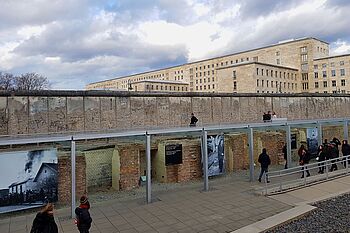Prosperity, discipline, cars – these are the clichés that people all over the world associate with Germany. But millions of immigrants and a liberalized lifestyle have led to dramatic changes in the country. In public debate, however, the critical examination of National Socialism continues to play a major role. The communist dictatorship in the GDR has also produced a rich landscape of institutions engaged in a reappraisal of the past. For this reason, many post-dictatorial states look to Germany as a role model.
Country with a Double Past

Credit: Hubertus Knabe
Germany – officially the Federal Republic of Germany – is a densely populated country in the middle of Europe. Some 83 million people live here on almost 358,000 square kilometers. Nearly 60 percent of the population belongs to a Christian church with the north mostly Protestant and the south predominantly Catholic. The majority of people in East Germany are not affiliated with any religion. As a consequence of immigration, more than five million Muslims now live in Germany, too.
For centuries, the German-speaking population of Europe lived in a loose confederation of states. At the instigation of Prussia, the German Reich was founded in 1871. Henceforth the Prussian king was also the German emperor. But the November Revolution at the end of the World War I brought the monarchy to an end in 1918. The first German democracy – the Weimar Republic – was subsequently established, but lasted only 14 years.
Adolf Hitler was appointed Chancellor of the Reich in 1933. Within a few weeks he had established a one-party state under the leadership of the National Socialist German Workers’ Party (NSDAP). State and society were quickly brought into line with the party. Over time the approximately 500,000 Jews living in Germany were disenfranchised, leading more than half to immigrate. Most of the Jews who remained were ultimately murdered. During World War II, which began in 1939 with the invasion of Poland by the German Wehrmacht, an estimated 65 million people were killed. More than six million Jews were murdered, mostly in extermination camps in occupied Poland. After twelve years, the National Socialist regime ended with the unconditional surrender of the German Wehrmacht.
Germany was divided into four occupation zones in 1945. The British, American and French zones came together to form the Federal Republic of Germany (West Germany) in 1949; the Soviet zone was established as the German Democratic Republic (GDR). At the behest of the Soviet Union, the eastern part of Germany fell to Poland. The Federal Republic was a parliamentary democracy, which joined NATO in 1955 and the European Economic Community in 1958. The GDR was a socialist dictatorship modelled after the Soviet Union. It joined the Council for Mutual Economic Assistance in 1950 and the Warsaw Pact in 1955. While a market economy system prevailed in the Federal Republic, the Socialist Unity Party of Germany (SED) implemented a planned economy in the GDR. Between 1949 and 1989, more than 3.8 million people fled the GDR and about 1,000 died in attempted escapes. An estimated 200,000 people or more were imprisoned as political prisoners in the GDR. After the Peaceful Revolution led to the collapse of the SED regime, the GDR joined the Federal Republic in 1990.
Because Germany experienced two dictatorships, one now speaks of a “double” past with which the country must come to terms. After 1945, almost 11,700 people were convicted of Nazi crimes in West Germany, 5,000 of them by Allied military courts. Some one million victims received compensation. The Federal Republic also made restitution payments to Israel and other countries amounting to 2.3 billion euros. Forced laborers have received compensation since 2000.
At least 123,000 people were imprisoned in Soviet special camps in East Germany after 1945, about a third of whom did not survive. Some 45,000 people were sentenced in summary trials to long prison terms or death by Soviet military tribunals. Nearly 10,000 were later rehabilitated. Between 1945 and 1989, East German courts sentenced about 21,000 people for Nazi crimes, often in violation of the rule of law. The GDR rejected reparations to Israel and refused to return Jewish property. People in East Germany who had suffered persecution under the Nazis were granted honorary pensions.
After 1989, preliminary proceedings were initiated against some 100,000 people for communist crimes committed in the GDR. Just over 1,400 were charged and at least 750 were convicted. Forty people received prison sentences ranging from three months to 6.6 years. Former political prisoners currently receive 300 euros compensation for every month spent in prison. Those who earn less than 1,272 euros monthly, receive an additional monthly victim’s pension of 330 euros (as of May 2020).
Federal Republic of Germany

Area: | 357,582 km² |
Inhabitants: | |
Population growth: | |
Population density: | 233 inhabitants per km² |
Seat of government: | Berlin, Bonn |
Official language: | German and several minority languages |
Political system: | Parliamentary democracy |
Head of state: | Federal President Frank-Walter Steinmeier (since 2017) |
Head of government: | Federal Chancellor Angela Merkel (since 2005) |
Freedom status: | |
GDP per capita: |
(Shqipëria)
(Հայաստան)
(Azərbaycan)
(Bosna i Hercegovina)
(България)
(Danmark)
(Eesti)
(Suomi)
(France)
(საქართველო)
(Ελλάδα)
(United Kingdom)
(Ireland)
(Қазақстан)
(Hrvatska)
(Latvija)
(Lietuva)
(Moldova)
(Црна Гора)
(Македонија)
(Polska)
(România)
(Россия)
(Sverige)
(Suisse)
(Србија)
(Slovensko)
(Slovenija)
(España)
(Česko)
(Україна)
(Magyarország)
(Città del Vaticano)
(Беларусь)
(Κύπρος)